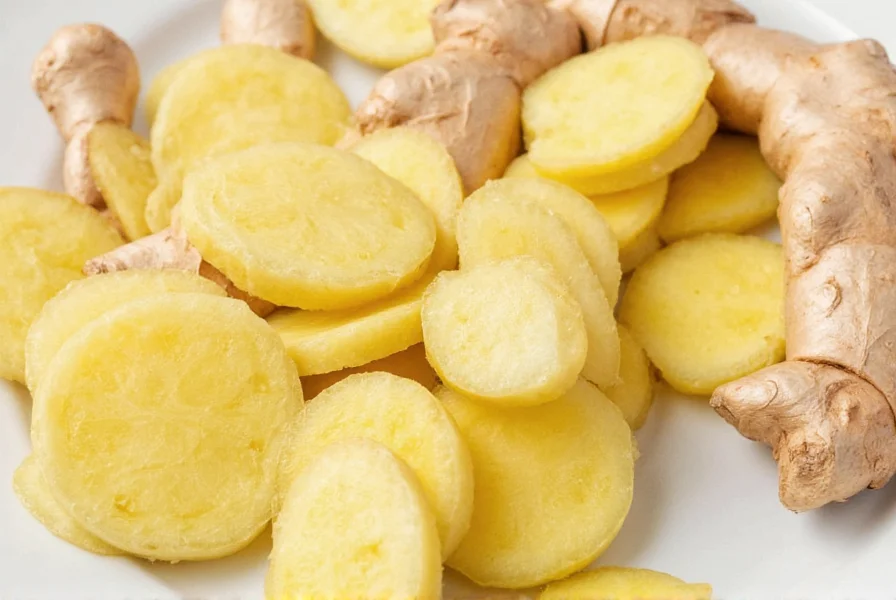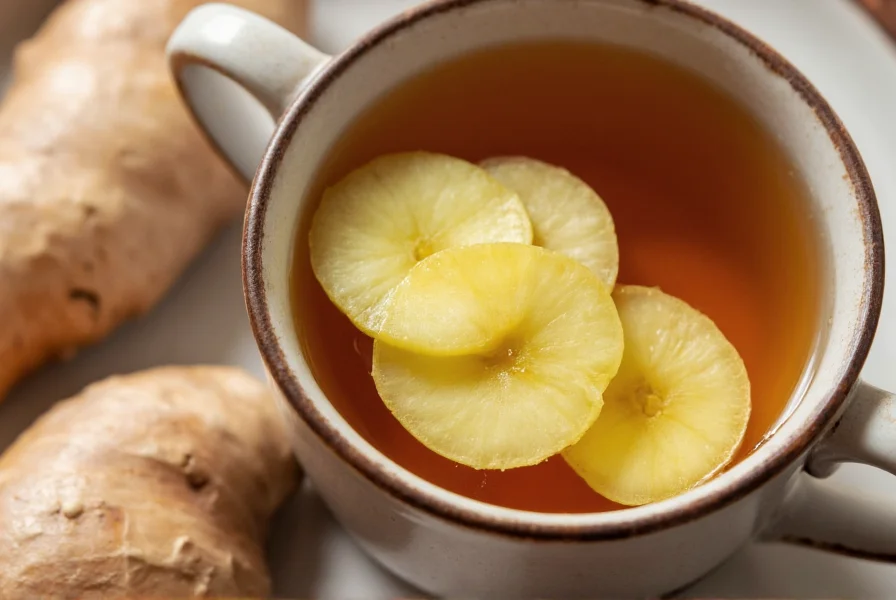Ginger tea has gained popularity as a natural remedy for digestive issues, including gastroesophageal reflux disease (GERD) and occasional heartburn. While many people report symptom relief after consuming ginger tea, understanding the scientific basis and appropriate usage is essential for those considering this natural approach to managing reflux symptoms.

The Science Behind Ginger and Reflux
Ginger (Zingiber officinale) contains bioactive compounds like gingerols and shogaols that may influence digestive processes. Several mechanisms could explain ginger's potential benefits for reflux:
- Gastric motility enhancement: Some research suggests ginger may accelerate gastric emptying, potentially reducing the amount of time stomach contents remain in contact with the lower esophageal sphincter.
- Anti-inflammatory effects: Ginger's compounds may reduce inflammation in the digestive tract, potentially soothing irritation caused by acid exposure.
- Antiemetic properties: Ginger is well-documented for reducing nausea, which often accompanies severe reflux episodes.
A 2021 review published in the Journal of Gastroenterology and Hepatology examined multiple studies on ginger's effects on digestive health. While the review noted ginger's potential benefits for nausea and gastric motility, it concluded that specific evidence for GERD treatment remains limited and warrants further investigation.
Research Evidence on Ginger Tea for Reflux
The scientific literature presents a mixed picture regarding ginger's effectiveness for reflux management:
| Study | Findings | Limitations |
|---|---|---|
| 2019 Clinical Trial (n=60) | Participants reported 30% reduction in mild reflux symptoms after 4 weeks of ginger supplementation | Small sample size; no placebo control; focused on mild cases only |
| 2022 Systematic Review | Insufficient evidence to recommend ginger as primary treatment for GERD; potential adjunct therapy | Reviewed only 7 studies meeting inclusion criteria |
| 2020 In Vitro Study | Ginger compounds showed protective effects on esophageal tissue exposed to acid | Lab study only; not tested in humans |
These findings suggest ginger may offer modest benefits for occasional, mild reflux symptoms but shouldn't replace conventional treatments for chronic GERD. The American College of Gastroenterology notes that while some natural remedies show promise, patients with frequent or severe symptoms should consult healthcare providers before relying solely on home treatments.
When Ginger Tea Might Help (and When It Might Not)
Ginger tea appears most beneficial for:
- Occasional, mild heartburn episodes
- Reflux accompanied by nausea
- Individuals seeking complementary approaches alongside conventional treatment
However, ginger tea may worsen symptoms for people with:
- Severe esophagitis (inflamed esophagus)
- Hiatal hernia-related reflux
- Sensitivity to spicy or pungent substances
- Reflux triggered by delayed gastric emptying
Some individuals report that ginger's warming properties actually aggravate their reflux symptoms. This variation in response highlights the importance of personal experimentation under medical guidance when considering ginger tea for reflux management.
Preparing Ginger Tea for Reflux Relief
If you decide to try ginger tea for reflux symptoms, proper preparation can maximize potential benefits while minimizing irritation:
- Select fresh ginger root: Choose firm, smooth ginger with no wrinkles or soft spots.
- Peel and slice: Remove the skin and cut into thin slices (¼ inch thick) to maximize surface area.
- Steep properly: Use 1-2 inches of sliced ginger per cup of hot (not boiling) water. Steep for 5-10 minutes—longer steeping increases potency but may cause irritation.
- Consider additions: A small amount of honey may soothe the esophagus, but avoid lemon which can trigger reflux in some people.
- Timing matters: Drink 20-30 minutes before meals to potentially aid digestion, or after meals if experiencing mild symptoms.

Safety Considerations and Potential Side Effects
While generally recognized as safe, ginger tea may cause issues for certain individuals:
- Medication interactions: Ginger may interact with blood thinners, diabetes medications, and certain heart medications.
- Pregnancy considerations: Consult your healthcare provider before regular consumption during pregnancy.
- Dosage limits: Most studies use 1-1.5 grams of ginger daily; excessive consumption may cause stomach upset.
- Worsening symptoms: Discontinue use if reflux symptoms intensify after consumption.
The National Center for Complementary and Integrative Health recommends consulting with a healthcare provider before using ginger regularly if you have a chronic digestive condition or take prescription medications.
When to Seek Professional Medical Advice
Ginger tea should never replace professional medical treatment for persistent reflux symptoms. Consult a healthcare provider if you experience:
- Heartburn occurring more than twice weekly
- Difficulty swallowing
- Unintended weight loss
- Nighttime symptoms that disrupt sleep
- Symptoms persisting despite home remedies
Chronic reflux can lead to complications like esophagitis, Barrett's esophagus, or even esophageal cancer if left untreated. Professional diagnosis ensures appropriate treatment and rules out serious underlying conditions.
Complementary Approaches to Reflux Management
For those exploring natural remedies alongside ginger tea, evidence suggests these approaches may provide additional relief:
- Elevating the head of your bed 6-8 inches
- Avoiding large meals within 3 hours of bedtime
- Identifying and eliminating personal trigger foods
- Maintaining a healthy weight
- Quitting smoking
Unlike ginger tea for acid reflux relief, which has limited evidence, these lifestyle modifications have stronger scientific support for managing GERD symptoms according to gastroenterology guidelines.
Conclusion
Ginger tea shows promise as a complementary approach for managing mild, occasional reflux symptoms, but it's not a standalone treatment for GERD. The current scientific evidence supports cautious, moderate use as part of a comprehensive reflux management strategy that includes lifestyle modifications and, when necessary, conventional medical treatments. Individual responses vary significantly, so personal experimentation under medical guidance is recommended when considering ginger tea for reflux relief.
Does ginger tea help with acid reflux immediately?
Ginger tea may provide mild relief for some individuals within 15-30 minutes due to its potential anti-inflammatory effects, but it's not an immediate solution like antacids. Most people report gradual improvement with regular use over days or weeks for mild symptoms. However, some individuals experience worsened symptoms shortly after consumption, so personal response varies significantly.
How much ginger tea should I drink for reflux?
For reflux management, most studies suggest 1-2 cups daily using 1-2 inches of fresh ginger root per cup. Start with a weaker preparation (5-minute steep) and monitor your response. Do not exceed 4 grams of ginger daily from all sources, as higher amounts may irritate the digestive tract. Consult your healthcare provider for personalized recommendations, especially if you have severe GERD or take medications.
Can ginger tea make acid reflux worse?
Yes, ginger tea can worsen reflux symptoms for some individuals. Ginger's pungent compounds may irritate an already inflamed esophagus or increase stomach acid production in certain people. Those with severe esophagitis, hiatal hernias, or sensitivity to spicy foods are more likely to experience negative effects. If your symptoms intensify after drinking ginger tea, discontinue use and consult your healthcare provider.
What's the best time to drink ginger tea for reflux?
For potential reflux prevention, drink ginger tea 20-30 minutes before meals to support digestion. If using it for symptom relief, consume it after meals but not immediately before lying down. Avoid drinking ginger tea within 3 hours of bedtime, as it may interfere with sleep for some people. Individual responses vary, so track your symptoms to determine the optimal timing for your specific condition.
How does ginger tea compare to other natural remedies for reflux?
Ginger tea differs from other natural remedies like chamomile or licorice root tea in its mechanism of action. While chamomile primarily soothes inflammation, ginger may enhance gastric motility. Unlike peppermint tea—which often worsens reflux—ginger generally doesn't relax the lower esophageal sphincter. However, individual responses vary significantly, and what works for one person may not work for another. Lifestyle modifications remain the most evidence-based approach for managing chronic reflux.











 浙公网安备
33010002000092号
浙公网安备
33010002000092号 浙B2-20120091-4
浙B2-20120091-4